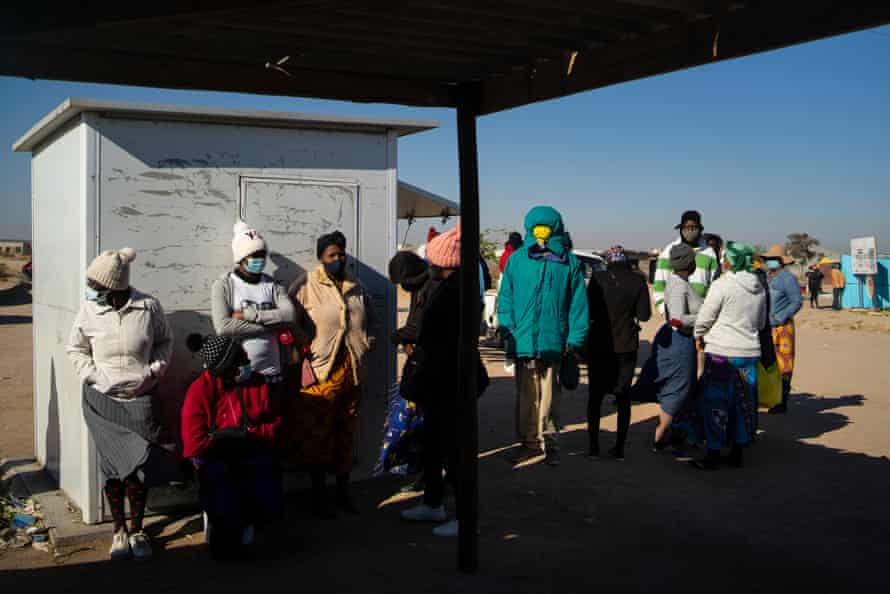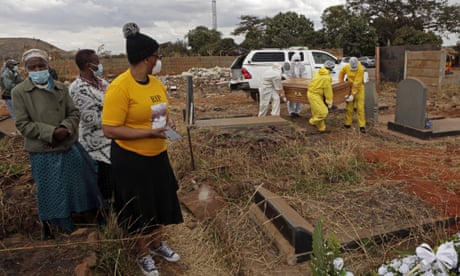Firms accused of ‘rounding up workers like animals’ for compulsory vaccination as country acts to stop spread of virus

The Zimbabwe Congress of Trade Unions (ZCTU), an amalgamation of 35 labour unions representing 189,000 people, has accused employers of infringing workers’ rights, saying there is no law providing for compulsory vaccinations. It has taken the government and six companies to court for ordering employees to have the vaccine, arguing that the companies are “taking the law into their own hands” by forcing the issue.
In the court application, seen by the Guardian and addressed to the six companies, as well as attorney general Prince Machaya and minister for labour Paul Mavima, the ZCTU calls for an end to compulsory jabs, saying: “Each person having fully considered the implications and effects of vaccination is expected to make a personal decision.”
The union also argues that research remains inconclusive, meaning “no person may be compelled” to get vaccinated.
According to the claim, employers that have ordered staff to stop reporting for duty unless they are vaccinated include the state-owned Zimbabwe National Roads Administration (Zinara) and telecoms group TelOne, insurer Zimnat, fertiliser producer Windmill, agricultural group Seed Co and the Manicaland State University of Applied Sciences.
TelOne has also threatened to cut employees’ Covid risk allowances. “On 21 July 2021, TelOne issued a staff notice directing unvaccinated employees to go on immediate leave. The company also informed such employees of the withdrawal of the Covid-19 risk allowance,” the court application, dated 13 August, reads.

Machaya said the ZCTU’s court challenge was misplaced and that neither he nor the labour minister should have been cited in it. “It is the duty of the cabinet and not that of this honourable court to compel the minister to enact legislation as well as subsidiary legislation. At the same time, both the respondents have no obligation to issue statutory instruments related to public health issues. This is the primary responsibility of the minister of health and childcare.”

Reeling from the economic impact of Covid, companies have been pushing employees to get the vaccine, seeing it as Zimbabwe’s only chance of recovery after successive lockdowns that have crippled an already weak economy.
Some employers have been booking workers en masse for vaccination, while others insist on Covid tests every fortnight. Now, there are demands for vaccination certificates before employees can enter a workplace. Unions fear that thousands may lose their jobs if the government does not intervene.
“This practice has become rampant among employers and that is why we decided to go to the court. We are not sure why it has not been reported widely. There are many companies who are rounding up workers like animals, taking them to vaccination centres,” said ZCTU secretary general, Japhet Moyo. “You can imagine an employer taking you to a vaccination centre and employees having to plead with health workers if they have underlying health conditions. We have a situation where people with hypertension have been vaccinated. Some cannot stand their ground.”

In June, vice-president and health minister Constantino Chiwenga said that vaccination could be made mandatory for anyone entering public spaces. According to the Zimbabwe government, about 2.5 million people have received a first dose of the Covid vaccine so far – its target is to have 10 million fully vaccinated by December.
Zimbabwe has bought 13m of the 20m doses of vaccines required to meet this target, mainly from China, in an attempt to stop the spread of the virus. A devastating third wave accounted for 50% of Zimbabwe’s total Covid deaths, leaving mortuaries full and funeral companies overwhelmed.
Last week, the government extended vaccination to teenagers over the age of 14. Only fully vaccinated people are allowed to eat in restaurants, a move intended to encourage more Zimbabweans to get shots.
“On the advice of scientists, Zimbabwe will start administering vaccines to children aged between 14 and 17,” the information minister, Monica Mutsvangwa, said.



Some businesses have scheduled mass vaccinations for their employees, while others require Covid tests every two weeks. Vaccination certificates are now required before employees may enter the job. If the government does not act, unions worry that thousands of people may lose their employment.